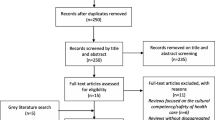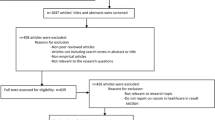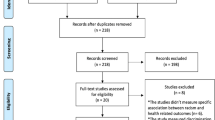Abstract
The primary goal of this study was to examine effects of bicultural efficacy, or perceived confidence in dealing with bicultural acculturation stressors, on type 2 diabetes management and health for first-generation, Cantonese-speaking, Chinese American immigrants (N = 162) recruited for a larger community-based diabetes intervention study (Chesla et al. in Res Nurs Health 36(4):359–372, 2013. doi:10.1002/nur.21543). The current study also tested whether a new Bicultural Efficacy in Health Management (BEFF-HM) scale is a more robust predictor of diabetes and health outcomes than proxy (years in the U.S.) and general acculturation measures. Hierarchical regression analyses of cross-sectional data revealed that high BEFF-HM was significantly related to positive outcomes on five of six diabetes and health measures as hypothesized after accounting for participant characteristics, proxy and general acculturation measures, and social support. Proxy and general acculturation measures failed to predict any study outcome supporting our secondary hypothesis that BEFF-HM is a better predictor of Chinese American immigrants’ diabetes and health management. An immigrant-focused research approach advances understanding of acculturation and bicultural efficacy effects on health by identifying key acculturation domains for study.
Similar content being viewed by others
References
American Diabetes Association. (2015). Standards of medical care in diabetes—2015. Diabetes Care, 38, S33–S40.
Bacallao, M. L., & Smokowski, P. R. (2005). “Entre Dos Mundos” (Between Two Worlds): Bicultural skills training with Latino immigrant families. Journal of Primary Prevention, 26, 485–509. doi:10.1007/s10935-10005-10008-10936
Berry, J. (2003). Conceptual approaches to acculturation. In K. M. Chun, P. B. Organista, & G. Marin (Eds.), Acculturation: Advances in theory, measurement and applied research (pp. 17–37). Washington D.C.: American Psychological Association.
Berry, J. W. (2007). Acculturation strategies and adaptation. In J. E. Lansford, K. Deater-Deckard, M. H. Bornstein, J. E. Lansford, K. Deater-Deckard, & M. H. Bornstein (Eds.), Immigrant families in contemporary society (pp. 69–82). New York: Guilford Press.
Chesla, C. A., & Chun, K. M. (2005). Accommodating type 2 diabetes in the Chinese American family. Qualitative Health Research, 15, 240–255. doi:10.1177/1049732304272050
Chesla, C. A., Chun, K. M., & Kwan, C. (2009). Cultural and family challenges to managing type 2 diabetes in immigrant Chinese Americans. Diabetes Care, 32, 1812–1816. doi:10.2337/dc09-0278
Chesla, C. A., Chun, K. M., Kwan, C. M., Mullan, J. T., Kwong, Y., Hsu, L., & Waters, C. M. (2013). Testing the efficacy of culturally adapted coping skills training for Chinese American immigrants with type 2 diabetes using community-based participatory research. Research in Nursing and Health, 36, 359–372. doi:10.1002/nur.21543
Chun, K. M., & Akutsu, P. D. (2008). Assessing acculturation in Asian American immigrant and refugee families: Guidelines for mental health practitioners. In N. H. Trinh, Y. Rho, K. M. Sanders, & F. Lu (Eds.), Handbook on Asian American health: Families, acculturation and resilience. Totowa: Human Press Inc.
Chun, K. M., Balls Organista, P., & Marin, G. (Eds.). (2003). Acculturation: Advances in theory, measurement and applied research. Washington D.C.: American Psychological Association.
Chun, K. M., & Chesla, C. A. (2004). Cultural issues in disease management for chinese americans with type 2 diabetes. Psychology and Health, 19, 767–785. doi:10.1080/08870440410001722958
Chun, K. M., Chesla, C. A., & Kwan, C. M. (2011). “So We Adapt Step by Step”: Acculturation experiences affecting diabetes management and perceived health for Chinese American immigrants. Social Science and Medicine, 72, 256–264. doi:10.1016/j.socscimed.2010.11.010
Chun, K. M., & Hsu, J. (2012). Adjustment disorders in Asians. In E. C. Chang & E. C. Chang (Eds.), Handbook of adult psychopathology in Asians: Theory, diagnosis, and treatment (pp. 328–356). New York: Oxford University Press.
Cutrona, C. E., & Russell, D. W. (1987). The provisions of social relationships and adaptation to stress. In W. H. Jones & D. Perlman (Eds.), Advances in personal relationships (pp. 37–67). Greenwich: JAI Press.
David, E. J. R., Okazaki, S., & Saw, A. (2009). Bicultural self-efficacy among college students: Initial scale development and mental health correlates. Journal of Counseling Psychology, 56, 211–226. doi:10.1037/a0015419
Duangdao, K., & Roesch, S. (2008). Coping with diabetes in adulthood: A meta-analysis. Journal of Behavioral Medicine, 31, 291–300. doi:10.1007/s10865-008-9155-6
Fisher, L., Chesla, C. A., Chun, K. M., Skaff, M. M., Mullan, J. T., Kanter, R. A., & Gardiner, P. S. (2004). Patient-appraised couple emotion management and disease management among Chinese American patients with type 2 diabetes. Journal of Family Psychology, 18, 302–310. doi:10.1037/0893-3200.18.2.302
Gallant, M. P. (2003). The influence of social support on chronic illness self-management: A review and directions for research. Health Education and Behavior, 30, 170–195. doi:10.1177/1090198102251030
Gomez, S. L., Kelsey, J. L., Glaser, S. L., Lee, M. M., & Sidney, S. (2004). Immigration and acculturation in relation to health and health-related risk factors among specific Asian subgroups in a health maintenance organization. American Journal of Public Health, 94, 1977–1984.
Gupta, L. S., Wu, C. C., Young, S., & Perlman, S. E. (2011). Prevalence of diabetes in New York City, 2002–2008. Comparing foreign-born South Asians and other Asians with US born whites, blacks and Hispanics. Diabetes Care, 34, 1791–1793. doi:10.2337/dc1711-0088
Hsu, W. C., Boyko, E. J., Fujimoto, W. Y., Kanaya, A., Karmally, W., Karter, A., & Arakaki, R. (2012). Pathophysiologic differences among Asians, native Hawaiians, and other Pacific Islanders and treatment implications. Diabetes Care, 35, 1189–1198. doi:10.2337/dc12-0212
Jacobson, A. M., de Groot, M., & Samson, J. A. (1994). The evaluation of two measures of quality of life in patients with type I and type II diabetes. Diabetes Care, 17, 267–274. doi:10.2337/diacare.2317.2334.2267
Kandula, N. R., Diez-Roux, A. V., Chan, C., Daviglus, M. L., Jackson, S. A., Ni, H., & Schreiner, P. J. (2008). Association of acculturation levels and prevalence of diabetes in the multi-ethnic study of atherosclerosis (MESA). Diabetes Care, 31, 1621–1628. doi:10.2337/dc07-2182
Kim, H. S., Sherman, D. K., & Taylor, S. E. (2008). Culture and social support. American Psychologist, 63, 518–526. doi:10.1037/0003-066X
LaFromboise, T., Albright, K., & Harris, A. (2010). Patterns of hopelessness among American Indian adolescents: Relationships by levels of acculturation and residence. Cultural Diversity and Ethnic Minority Psychology, 16, 68–76. doi:10.1037/a0016181
LaFromboise, T., Coleman, H. L., & Gerton, J. (1993). Psychological impact of biculturalism: Evidence and theory. Psychological Bulletin, 114, 395–412. doi:10.1037//0033-2909.1114.1033.1395
LaFromboise, T., & Rowe, W. (1983). Skills training for bicultural competence: Rationale and application. Journal of Counseling Psychology, 30, 589–595.
Lee, J. W. R., Brancati, F. L., & Yeh, H.-C. (2011). Trends in the prevalence of type 2 diabetes in Asians versus Whites: Results from the United States National Health Interview Survey, 1997–2008. Diabetes Care, 34, 353–357.
Marin, G., Balls Organista, P., & Chun, K. M. (2003). Current issues and findings in acculturation research. In G. Bernal, J. E. Trimble, F. T. L. Leong, & B. A. K. (Eds.), Handbook of ethnic minority psychology. Thousand Oaks: Sage Publications.
Miltiades, H. B., & Wu, B. (2008). Factors affecting physician visits in Chinese and Chinese immigrant samples. Social Science and Medicine, 66, 704–714.
Nguyen, A.-M. D., & Benet-Martínez, V. (2013). Biculturalism and adjustment: A meta-analysis. Journal of Cross-Cultural Psychology, 44, 122–159. doi:10.1177/0022022111435097
O’Brien, R. M. (2007). A caution regarding rules of thumb for variance inflation factors. Quality and Quantity: International Journal of Methodology, 41, 673–690. doi:10.1007/s11135-006-9018-6
Oster, A., & Yung, J. (2010). Dietary acculturation, obesity, and diabetes among Chinese immigrants in New York City. Diabetes Care, 33, e109. doi:10.2337/dc09-2291
Peyrot, M., Egede, L. E., Campos, C., Cannon, A. J., Funnell, M. M., Hsu, W. C., & Stuckey, H. L. (2014). Ethnic differences in psychological outcomes among people with diabetes: USA results from the second Diabetes Attitudes, Wishes, and Needs (DAWN2) study. Current Medical Research and Opinion, 30, 2241–2254. doi:10.1185/03007995.2014.947023
Polonsky, W. H., Fisher, L., Earles, J., Dudl, R. J., Lees, J., Mullan, J., & Jackson, R. A. (2005). Assessing psychosocial distress in diabetes: Development of the diabetes distress scale. Diabetes Care, 28, 626–631. doi:10.2337/diacare.2328.2333.2626
Radloff, L. S. (1977). The CES-D scale: A self-report depression scale for research in the general population. Applied Psychological Measurement, 1, 385–401. doi:10.1177/014662167700100306
Rajpathak, S. N., & Wylie-Rosett, J. (2011). High prevalence of diabetes and impaired fasting glucose among Chinese immigrants in New York City. Journal of Immigrant and Minority Health, 13, 181–183. doi:10.1007/s10903-010-9356-2
Salant, T., & Lauderdale, D. S. (2003). Measuring culture: A critical review of acculturation and health in Asian immigrant populations. Social Science and Medicine, 57, 71–90. doi:10.1016/S0277-9536(02)00300-3
Shinagawa, L. H., & Kim, D. Y. (2008). A portrait of Chinese Americans: A national demographic and social profile of Chinese Americans. College Park: OCA and the Asian American Studies Program, University of Maryland.
Sue, D. W., & Sue, D. (1999). Counseling the culturally different : Theory and practice (3rd ed.). New York: Wiley.
Suinn, R. M., Ahuna, C., & Khoo, G. (1992). The Suinn-Lew Asian self-identity acculturation scale: Concurrent and factorial validation. Educational and Psychological Measurement, 52, 1041–1046. doi:10.1177/0013164492052004028
Taylor, S. E. (2011). Social support: A review. In H. S. Friedman & H. S. Friedman (Eds.), The Oxford handbook of health psychology (pp. 189–214). New York: Oxford University Press.
Ware, J. E., & Sherbourne, C. D. (1992). The MOS 36-item Short-Form Health Survey (SF-36). I. Conceptual framework and item selection. Medical Care, 30, 473–483.
Wei, M., Liao, K. Y.-H., Chao, R. C.-L., Mallinckrodt, B., Tsai, P.-C., & Botello-Zamarron, R. (2010). Minority stress, perceived bicultural competence, and depressive symptoms among ethnic minority college students. Journal of Counseling Psychology, 57, 411–422. doi:10.1037/a0020790
Xu, Y., Pan, W., & Liu, H. (2011). The role of acculturation in diabetes self-management among Chinese Americans with type 2 diabetes. Diabetes Research and Clinical Practice, 93, 363–370. doi:10.1016/j.diabres.2011.05.010
Ying, Y.-W. (2009). Strengthening Intergenerational/Intercultural Ties in Immigrant Families (SITIF): A parenting intervention to bridge the Chinese American intergenerational acculturation gap. In N.-H. Trinh, Y. C. Rho, F. G. Lu, & K. M. Sanders (Eds.), Handbook of mental health and acculturation in Asian American families (pp. 45–64). Totowa: Humana Press.
Zane, N., & Mak, W. (2003). Major approaches to the measurement of acculturation among ethnic minority populations: A content analysis and alternative empirical strategy. In K. Chun, P. B. Organista, & G. Marin (Eds.), Acculturation: Advances in theory, measurement and applied research (pp. 39–60). Washington D. C.: American Psychological Association.
Acknowledgments
This project was supported by the National Institute of Nursing Research (1R01NR010693).
Author information
Authors and Affiliations
Corresponding author
Ethics declarations
Conflict of Interest
Kevin M. Chun, Christine M. L. Kwan, Lisa A. Strycker, and Catherine A. Chesla declare that they have no conflict of interest.
Human and animal rights and Informed Consent
All procedures followed were in accordance with ethical standards of the responsible committee on human experimentation (institutional and national) and with the Helsinki Declaration of 1975, as revised in 2000. Informed consent was obtained from all patients for being included in the study.
Rights and permissions
About this article
Cite this article
Chun, K.M., Kwan, C.M.L., Strycker, L.A. et al. Acculturation and bicultural efficacy effects on Chinese American immigrants’ diabetes and health management. J Behav Med 39, 896–907 (2016). https://doi.org/10.1007/s10865-016-9766-2
Received:
Accepted:
Published:
Issue Date:
DOI: https://doi.org/10.1007/s10865-016-9766-2




